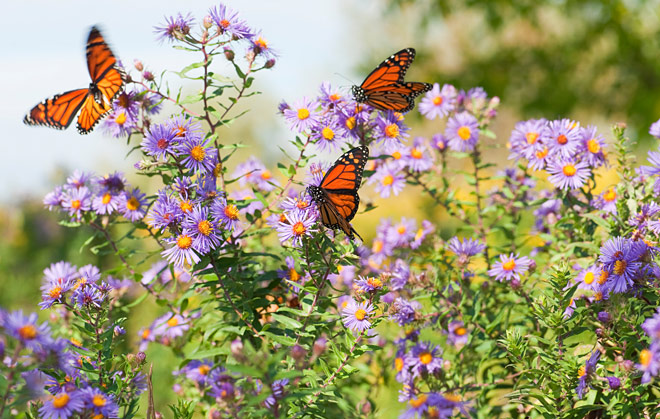People who love to garden also tend to enjoy watching butterflies flitting about. After all, butterflies are just as pretty to look at as the flowers that they visit. Gardeners can entice even more butterflies to visit their gardens by creating gardens specifically for butterflies.
It’s quite easy to create a butterfly garden. You may even find that you already grow some flowers that attract butterflies. With just a little effort you can create a beautiful haven for these lovely winged creatures, and the butterflies will appreciate your efforts.
If you’re starting from scratch and will be creating a new planting bed for your butterfly garden, you’ll first want to learn how to properly create a planting bed for your plants. You can find information on preparing raised planting beds at http://www.freeplants.com
When deciding where to locate your butterfly garden, choose a spot that is not isolated from other plants. Butterflies will be more likely to find your garden if there are other flowers nearby to lead them to your butterfly garden. But if your butterfly garden is the only patch of flowers in a vast sea of grass, butterflies won’t have much reason to be in the area. If you have a border of flowering shrubs and other butterfly-enticing plants are scattered around your yard, the butterflies are much more likely to spend time in your garden.
The butterfly garden should include a variety of plants that attract butterflies, and those plants should be in a variety of colors and heights. Consider planting azaleas, rhododendrons and lilacs for height. Fragrant ‘James McFarland’ lilacs seem to be especially attractive to butterflies. Weigela, with its flowers like dainty trumpets, is another good shrub for attracting butterflies.
No butterfly garden should be without Butterfly Milkweed (Asclepias tuberosa). Not only will the bright orange blossoms attract many butterflies, but the plant will also provide food for caterpillars. Without the caterpillars there would be no butterflies. Dill and parsley also provide food for butterfly caterpillars. If you’re lucky, you may even have Monarch butterflies laying their eggs on the milkweed and you can watch the entire life cycle, from caterpillar to chrysalis to butterfly.
Many other commonly grown flowers will attract butterflies, including hollyhocks, purple coneflowers (Echinacea), Black-eyed Susans (rudbeckia), cosmos, huechera, zinnias, beebalm and cleome. Buddleia, also known as butterfly bush, is a must in any butterfly garden. If you have room for this large plant, Mexican sunflower (tithonia) will attract many butterflies and hummingbirds with its sunny orange blooms.
Plan your butterfly garden so there are blooms all season long. The rhododendrons, azaleas and lilacs will provide a spring snack for butterflies, followed by summer-blooming plants such as the buddleia and asclepias. In the fall, butterflies will sip nectar from asters and ‘Autumn Joy” sedum.
In addition to providing food for butterflies, your butterfly garden should also provide a resting place along with shelter from the wind and cold. Include flat rocks in your garden where the butterflies can sun themselves. It’s even better if the rocks have shallow depressions where water will puddle and provide a place for butterflies to gather for a drink.
A small log pile will provide shelter from the weather for butterflies. You can also purchase butterfly shelters that look rather like tall, narrow birdhouses with several slots for entrances. These may attract butterflies, but in my experience wasps tend to move in, discouraging any butterflies from entering.
One final thing that every butterfly garden should include is a comfortable bench placed where you can sit and admire the beautiful butterflies. After all, you’ve created this garden not only for the butterflies but also for your own enjoyment.
By Kathy Anderson
Kathy Anderson has been an avid gardener for many years and has grown tomatoes by the acre, along with many other vegetables, flowers and landscape plants. Kathy recommends http://www.freeplants.com as a great place to learn more about gardening and more articles provided by http://gardening-articles.com
